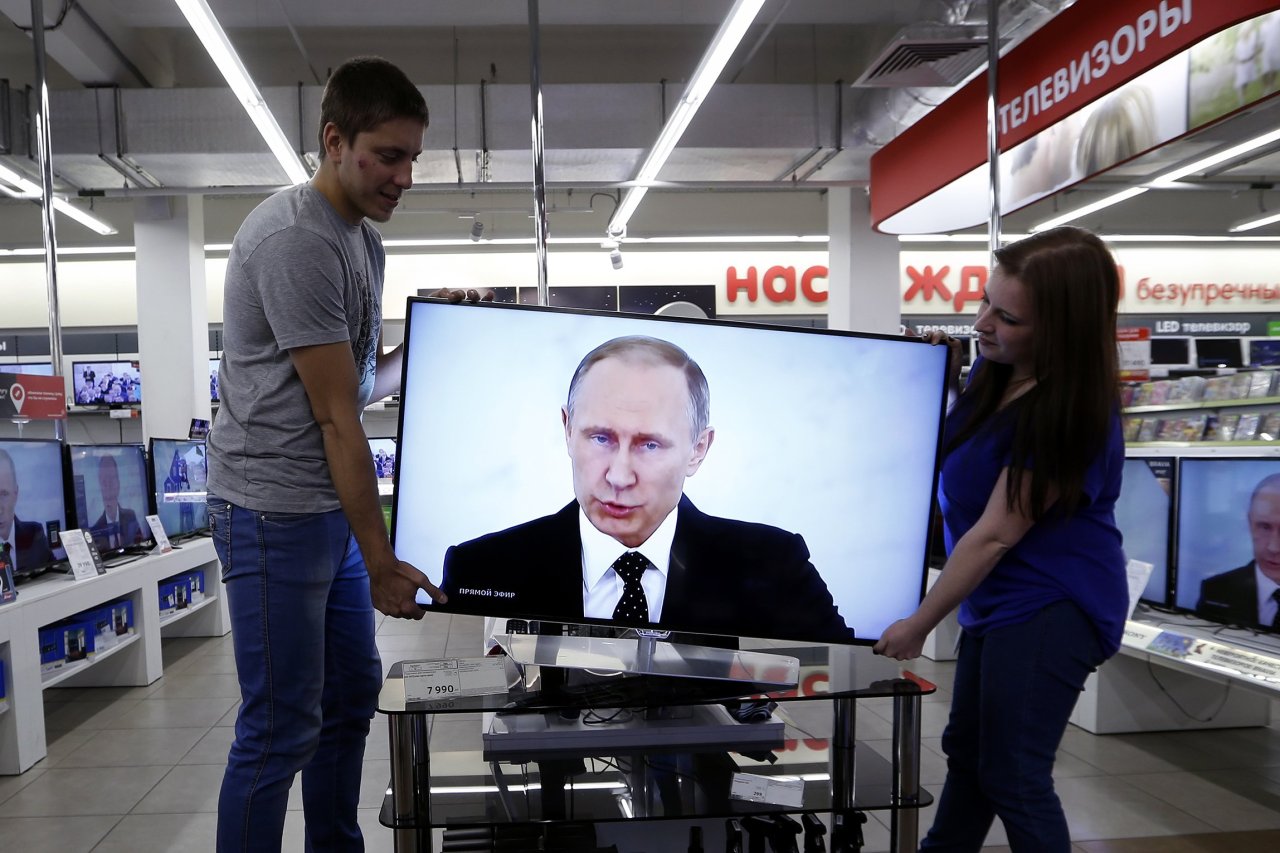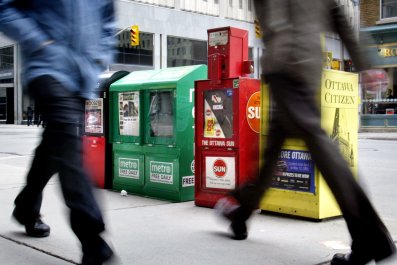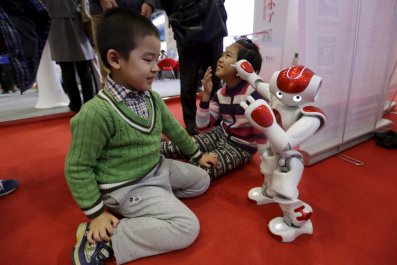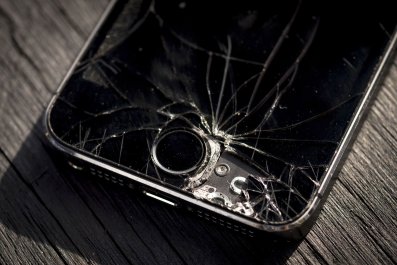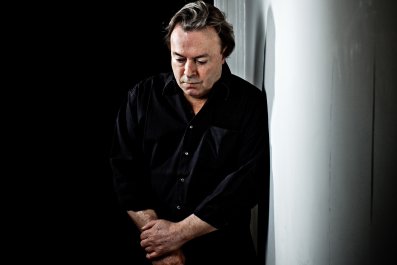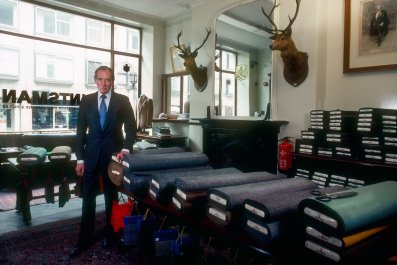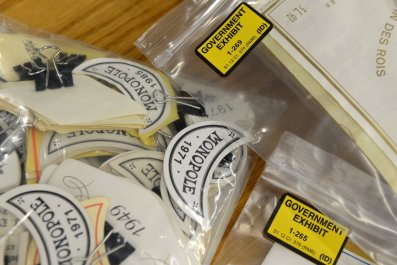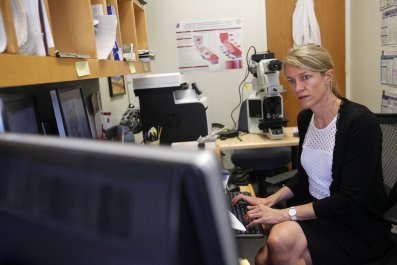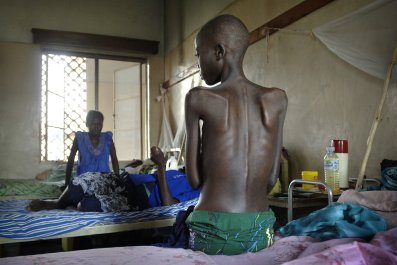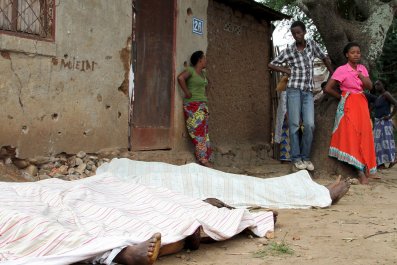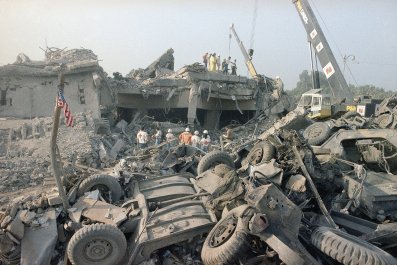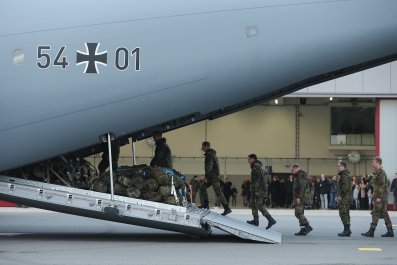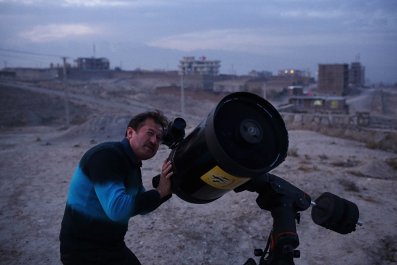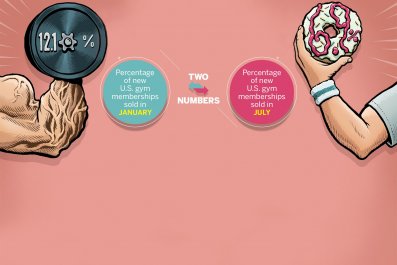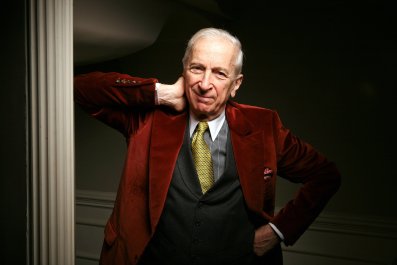Predicting a coming Russian revolution has been a favorite hobby of Russia watchers for years now. But since President Vladimir Putin's annexation of Crimea in March 2014, the doomsaying has intensified, as plunging oil prices and Western economic sanctions wreak havoc on the Russian economy. Yet even though the ruble has lost over half its value, inflation has risen from 5 percent to 16 percent and Russians' purchasing power has dropped to 1990s levels, Putin's approval ratings have so far remained close to a near-miraculous 80 percent thanks to a heady mix of military adventures and a barrage of patriotic propaganda.
There are gathering signs, though, that the Kremlin is bracing for a possible end to this period of national togetherness and is preparing for a possible wave of unrest. "If 2014 was the year that Russia went rogue, 2015 was the year that the costs of that course became manifest for Russians," wrote Brian Whitmore recently on U.S.-funded Radio Liberty's influential The Power Vertical Blog. "And next year should be when we learn whether Vladimir Putin's regime will be able to bear those costs."
In December, the Russian Duma rushed through a bill that allows state security officers to shoot at women (except, bizarrely, if they "appear pregnant"), children and disabled people "in cases of a terror act or armed attack." The law also hands the officers the right to enter private property to "maintain public security in emergency situations and during mass civil unrest." The OMON riot police, deployed in the tens of thousands during mass protests against Putin's return to the presidency in 2011, has seen its budget ring-fenced, while the rest of the police downsizes by 10 percent. At the same time, Russia's Interior Ministry has quintupled its order of a brand-new version of the RGS-50M grenade launcher, which was designed during the dying days of the Soviet regime in 1989 to fire tear gas and rubber bullets. "They are cheap to produce and effective to use," an enthusiastic spokesman for the Degtyarev factory told the Russian news agency TASS, which ran the story prominently.
On December 15, a new barbed-wire fence was installed around Ostankino, Moscow's central TV studio, making it harder for crowds to break in, as they did during anti-Kremlin protests in October 1993. Authorities also swapped the studio's regular security guards for elite troops from the KGB's successor agency, the Federal Security Service. Television has been crucial to creating the wave of patriotic fervor that has kept Putin popular even as prices rise and living standards fall—what Russians call the battle between the television and the refrigerator. Right now, the refrigerator seems to be winning: According to a recent poll by the independent Levada Center in Moscow, Russians' trust in the TV news has slipped from 79 percent in 2009 to just 41 percent today.
"Of course, [the Kremlin] understands that this is going to be a hard year, politically and economically," says Anton Krasovsky, a blogger and former anchor at NTV television in Russia who was fired last year for saying "a gay is just a person, like Putin." Krasovsky adds: "There is no more money for social spending, no money for increasing salaries to teachers, doctors, firemen.… But the priority is to prepare the way for Putin to remain president after [elections] in 2018."
So far, the Kremlin has kept discontent at bay with the age-old expedient of providing a steady diet of enemies to blame for Russia's problems—the Americans, the Ukrainians and now the Turks.
Three-quarters of Russians still blame the West for their economic woes, according to a recent study by the Institute of Sociology, part of Russia's Academy of Sciences—but the authors warned that within a year to 18 months this collective delusion will probably wear off, and people could begin to blame their rulers instead. Sixty percent of respondents reported that their standard of living had declined over the last year, and just 38 percent said they were willing to "make further sacrifices to defeat Russia's enemies."
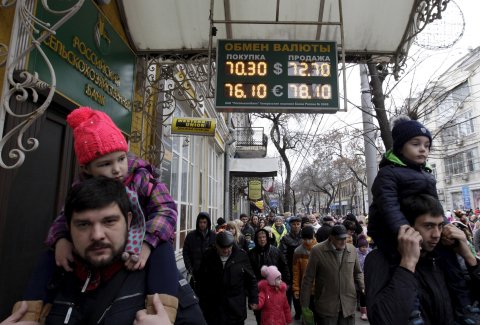
Over the past few weeks, there have been increasing indicators of discontent. Truckers went on strike in December to protest new tolls administered by Putin cronies, bringing Moscow traffic to a halt. Doctors and teachers also went on strike over pay and conditions in Central Russia. Shocking allegations about a business empire of the son of Yury Chaika, Russia's prosecutor general and a close Putin ally, were circulated broadly on the Internet. And prominent businessman Dmitry Potapenko during the Moscow Economic Forum, an annual gathering of Russia's top business leaders, publicly accused Kremlin-protected state bureaucrats of strangling businesses through massive corruption at the Moscow Economic Forum.
"You can expect a visit from men in uniform the moment your business takes off," said Potapenko, who runs a chain of supermarkets and a carpet factory. "Now there's less money, and the budget has to be plugged with something. [State officials] already muscled in on property a long time ago. Now all that's left are the businesses in the service industry." Nearly 2 million viewers watched his speech online.
That kind of public dissent appears to have rattled the Kremlin—and the Kremlin appears to be responding. In December, the Federal Guard Service—Putin's personal praetorian guard—was repurposed and deployed to all of Russia's provinces to act as an early-warning system for social unrest. Irina Makiyeva, a former state bank executive, has been drafted to head a working group to identify potential trouble spots for industrial unrest around Russia. The service will be conducting polling to assess citizens' levels of discontent, Makiyeva told the Russian cabinet in a televised session: "We're ready for things to get worse in some sectors. We conduct constant monitoring, especially in the problem cities." Makiyeva's team has developed a green, yellow and red classification system to identify potential unrest. It has also worked out a velvet glove–iron fist package of emergency economic aid and heavy police action to identify and arrest agitators should any protests arise.
"Every action of [Kremlin chief of staff] Vyacheslav Volodin is based absolutely on this so-called closed polling," says Mikhail Zygar, former editor-in-chief of the opposition Dozd TV and author of the best-selling All the Kremlin's Men, a study of the Putin regime. "These polls confirm that everything they're doing is right, that Putin is popular and the people love him. And the polls are absolutely consistent. [The Kremlin is] sure that there will be no uprisings."
If that's true, why is the Kremlin taking so many pre-emptive security measures? Mark Galeotti, a Russia expert at New York University, argued in a recent article on Russia!, the independent online magazine, that the Kremlin's real purpose is to create a "theater of tyranny. A style of governance which actively encourages the appearance of being tougher and nastier than it really is, and at the same time enthusiastically telegraphs that it could be tougher and nastier still." Just as Russia's foreign policy in Syria, for instance, is all about projecting ruthlessness and great-power status by using a tiny military force, so its domestic policy is all about cowing protest before it happens. "Both depend on making Russia appear not only stronger than it is, but more ruthless, unpredictable and downright crazy, so it seems easier to accommodate than challenge it," wrote Galeotti. "And it works really well."
Theater or not, some very real victims have been scapegoated to discourage future protest. A handful of activists arrested at mass protests in 2011 and at isolated demonstrations since have been sentenced to prison terms ranging from two to four years. And just in case exiled oligarch Mikhail Khodorkovsky had planned on making trouble in Russia, prosecutors last month charged him with murder, effectively ensuring that he won't return to his homeland.
But for the Kremlin to truly stifle any chance of unrest once and for all, Russia would have to become prosperous again. In an era of low oil prices, that would mean becoming competitive—which would require the state to create a functioning and fair judicial system and suppress the predatory instincts of the bureaucratic and securocratic class. But that would mean dismantling the very basis of the kleptocratic system that Putin has built. So the Russian president is left with two basic tools: repression and patriotic fervor. They have served him well so far. The question is whether the Russian people will continue to believe the television after the refrigerators stand empty.
Correction: An earlier version of this story mistakenly said that Anton Krasovsky was fired for being HIV-positive. While he did announce that he had the virus last year—to much controversy—he was fired for saying: "A gay is just a person, like Putin."



